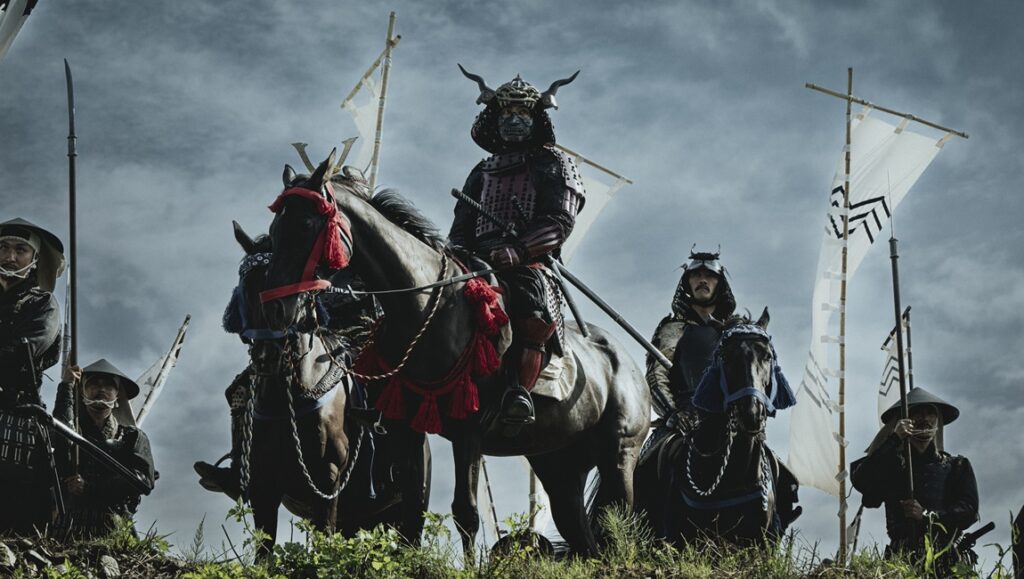Anytime Park Chan-wook makes a movie, it’s an event. One of the most exciting and formally striking auteurs to hail from South Korea — and of the 21st century in general — Park has enjoyed a lavish career of international acclaim, most notably for Oldboy, The Handmaiden, and Decision to Leave, the latter of which net him the Best Director Award at Cannes in 2022 for his troubles. His films are characterized by their rich whirlwind of style and thrillingly intricate plotting, which makes his involvement as co-screenwriter on Uprising all the more enticing, and the finished product all the more befuddling. Sharing scripting duties with Shin Chul, Park does not direct, instead passing duties off to art director and long-time collaborator Kim Sang-man, having previously worked with Park on Joint Security Area, Sympathy for Lady Vengeance, and I’m a Cyborg, But That’s OK (Park opted to keep busy with his television series, The Sympathizer). Despite being in development for years, Park’s screenplay feels at times like its painted with a broad brush, relaying a overly familiar story of two childhood friends who grow up finding themselves on opposite sides of the law — in this case, a fierce warrior of the common folk vying against the top lieutenant of a notorious monarch, all set against the backdrop of the Japanese invasion of Korea during the Joeson dynasty. While brimming with big-budget production values and featuring plenty of sequences of fanciful swordplay, Uprising could have sorely used Park’s skill behind the camera, but instead finds its edge dulled by the guiding hand of Kim, who frequently aims for competence over excellence.
In the late 16th century, Cheon-yeong (played as an adult by Gang Dong-won) is born into a life of servitude. With no mother, and after losing his father to suicide, Cheon-yeong is sold into the estate of the Deputy Commander for King Seonjo (Cha Seung-won). As a slave, Cheon-yeong’s sole duty is to receive punishment in the stead of the Deputy Commander’s son, Yi Jeong-ryo (Park Jeong-min), becoming an avatar of whippings as the noble boy cannot be physically harmed when falling behind on his sword training. Seizing an opportunity, Cheon-yeong befriends Jeong-ryo, helping him master the blade as he moves into young adulthood. When the Japanese invade Korea in 1592, the Deputy Commander’s estate becomes bifurcated, with the nobleman’s family accompanying the cowardly King Seonjo as they flee into the mountains, leaving Cheon-yeong and the rest of the commoners to fend for themselves. Using his own combat prowess and strategic acumen, Cheon-yeong builds a Resistance Army of common folk, assuming the role of the “Blue-Robed God” — so named after absconding with Jeong-ryo’s blue military garb and sword — in order to help ensure the survival of those left behind. Seven years into the invasion, Cheon-yeong and Jeong-ryo cross paths once again, now sworn adversaries hell bent on destroying each other.
Park’s screenplay is steeped in a lot of deep historical context, commencing with the death of rebellious and scholarly politician Jeong Yeo-rip, who drove a knife into his throat to avoid execution after declaring that there was fundamentally no difference between a king and a slave. King Seonjo does not take kindly to acts of sedition, regularly demonstrating his proclivity for having traitors beheaded and displaying their severed heads in town squares to scare the public off of getting any bright ideas. It’s this cruel world into which Cheon-yeong is born, decreed a slave as his folks before him, leading the child into a life of contempt and defiance for the government. He finds his place with Jeong-ryo, befriending the privileged child to better his own situation, highlighting the natural survival instincts of someone who has had to fight his entire life. Park takes time to allow this this friendship to unfold, with Cheon-yeong even taking Jeong-ryo’s sword exam for him, lest he embarrass his militant father.
The invasion of the Japanese upends their world, revealing King Seonjo’s own disdain for the people as he flees to save his own hide, resorting to violence against the common folk to prevent them from tagging along with his royal escort. Kim offers plenty of sword-fighting action to underline the severity of the conflict, indulging in slow-motion and exteneded takes, with one sequence showcasing the valiant parallel efforts of Cheon-yeong and Jeong-ryo as they fight off hordes of attackers — Japanese invaders for the former, Korean commoners for the latter. The Japanese in particular are depicted as a faceless army of brutes, but Park’s screenplay does introduce a third major player in the form of the fearsome Kikkawa Genshin (Jung Sung-il), a Japanese military official dubbed the “Nose Snatcher,” due to his practice of defacing the corpses of his slain foes.
Kim’s production is handsomely mounted, overflowing with terrific period costuming and set design (occasionally augmented with CGI to fill in the grander shots). Actor Kim Shin-rok is also a highlight as resistance warrior Bumdong, who gleefully charges into battle with a long-handled flail you’d be foolish to find yourself at the other end of. All that said, what really holds the narrative back is its pervasive conventionality, running through a basic storytelling paradigm and offering several egregiously telegraphed moments of “It’s like poetry, they rhyme,” bringing everything full circle. The film is also oddly divvied up into chapters, with each section break announced with an enormous text overly and a slightly misguided guitar riff on the soundtrack. Uprising indeed offers the occasional thrill, and isn’t wholesale a bad option for afternoon viewing, but given the pedigree involved it, it should have been better, even great, instead of settling for rote replication of similar films.
DIRECTOR: Kim Sang-man; CAST: Gang Dong-won, Park Jeong-min, Kim Shik-rok, Jin Seon-kyu; DISTRIBUTOR: Netflix; STREAMING: October 11; RUNTIME: 2 hr. 6 min.


Comments are closed.